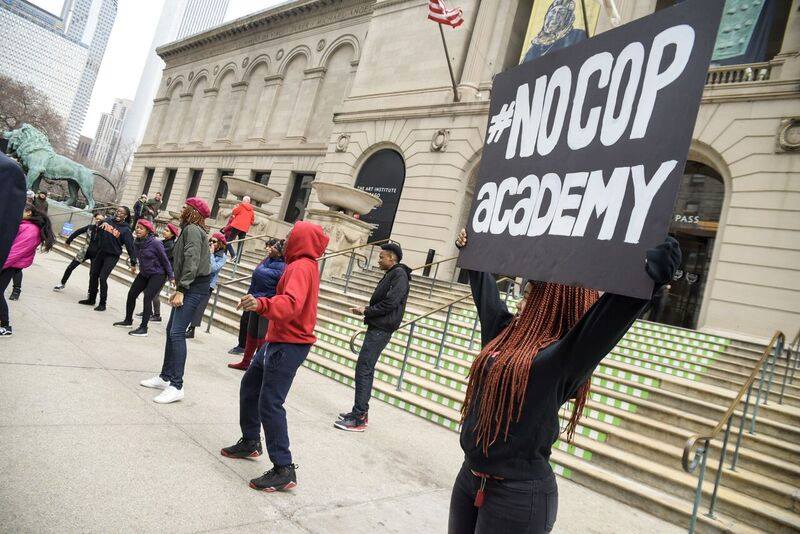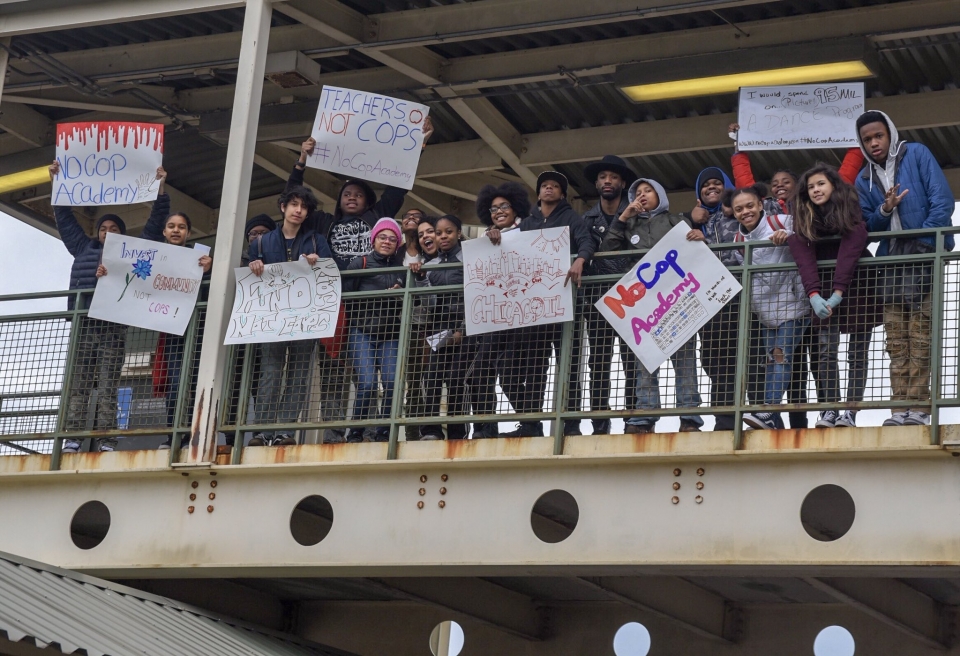
#NoCopAcademy youth flash mob Love & Struggle Photos
Debbie Southorn works for the American Friends Service Committee in Chicago, where she supports community efforts and youth organizing to end policing and reimagine community safety. In 2012, she co-founded the Chicago chapter of Black & Pink, currently serves on the National Committee of the War Resisters League, and is a Board Member of the Chicago Freedom School. She’s written about policing and white supremacy for outlets including Truthout, In These Times, and The Intercept.
Sophia: What is the cop academy? What do you want people to know about it? Why is it dangerous?
Debbie: In July of 2017, the mayor of Chicago, Rahm Emanuel, announced his plans to spend at least $95 million on a new cop academy on the west side of Chicago. He has been heralding this project as an important step towards reform of the police department, saying that this building will provide a clean slate for the Chicago Police Department (CPD). There are so many reasons why this is dangerous. We know that this isn’t about having a kinder, gentler Chicago police department.
This facility is being built so that the police department can have an expanded shooting range, so that they can do more mock raids. This is not about de-escalation and anti-bias training. They are trying to say that this is a response to the scathing Department of Justice report which delineated the realities of racism and violence that are plaguing this department. The report was issued in response to the killing of Laquan McDonald and the subsequent cover-up.
For Rahm Emanuel to say that this is an answer to what happened to Laquan, is a slap in the face to Laquan’s memory. He was a young Black teen, a 17-year-old who had experienced abuse in foster homes, who had been kicked out of schools, who had experienced psychiatric care that was inadequate, so to say that some new building for police is somehow going to resolve the issues that Laquan came into contact with in the first place is just an insult.
What communities need is access to mental health resources, access to quality public schools, access to the resources that not only keep young Black people alive in this city but resources that will allow them to thrive. We’re really trying to refuse this narrative coming from the city that we can just reform our way out of police violence by focusing on giving more money to the Chicago Police Department. Instead we want to use this moment to draw more attention on the misdoings of CPD to say hey, more money isn’t going to solve the problem. Any answer that’s about more money for policing is going to continue to harm communities most impacted by policing.
City officials say it’s about economic development in West Garfield Park and on the west side , but if we just interrogate that a little further it’s clear that this is part of the project of pushing Black people out of the city. A police training facility is not going to benefit all the residents of the neighborhood. It’s going to bring more police to the neighborhood, it’s going to make a historically Black, severely under- resourced community seem more palatable to rich and white folks. We know that a lot of historically Black and Latinx neighborhoods in Chicago are being gentrified right now and we see this as another piece in that puzzle and we really want to refuse that narrative. We also surveyed 500 residents in West Garfield Park to find out their thoughts about building the cop academy there and overwhelmingly encountered opposition and alternative ideas for how to invest in public safety on the West Side.

Sophia: Can you tell me about the history of policing and what an alternative system could look like?
Debbie: When we talk about the history of policing in this country, we have to connect it back to its roots in anti-Blackness and how many of the police forces came out of slave patrols, both slave owners and poor white folks who were enlisted to help catch freed or escaped enslaved Black people. And that legacy is something that we can’t shake. The other origin story of policing is very much around settler colonialism and the ways that early white militias were killing and fighting indigenous folks to push them off their land. Both of those origin stories are behind some of the earliest examples of domestic policing that we’ve seen in the United States.
Policing is absolutely a project of white supremacy. It’s a project of upholding colonialism and anti-Blackness and we’ve seen throughout the history of Chicago. The Chicago Police Department has been a critical force in upholding segregation and suppressing political movements for social justice and liberation. We can go way back to the Haymarket Riots and the role of the police framing & suppressing suspected anarchists. We can go back to 1919 and Red Summer in Chicago, when a white person killed a young Black kid for swimming in the lake too close to the white part of the beach. In the riots that followed police absolutely enabled violence against Black folks on the south side of the city.
Fast forward to the 1960s and the role of police in suppressing Black Power, Chicano, and other liberation movements. It’s really important that we always name and acknowledge the role of Chicago Police in murdering Fred Hampton, a 21-year-old Black leader of the Black Panthers in Chicago, who was assassinated in his house in a predawn raid ordered by the FBI and the state’s attorney. There are pictures of the white cops who killed him smiling as they carry his dead body out of the house.
CPD has a history of brutal repression of social movements as we saw in the violence around the Democratic National Convention in ’68. There were two decades of Chicago Police torture under commander Jon Burge who came back from Vietnam and brought the torture tactics he had learned during the war in Vietnam to his precincts on the south side. Over one hundred Black men were tortured for false confessions many of them placed on death row, many of them are still currently in prison.
So these long legacies of intense, brutal, repression and violence are things that are part and parcel to the Chicago police department but also just policing in this country. I think that much of where we are today, involves more and more people jumping on the band wagon saying that we need to end police violence, and that ranges from people asking for small reforms to saying, “No,” we need abolition, we need to actually talk about the fact that policing was built this way and we can’t just make tiny tweaks and hope that it will somehow work better, it’s doing exactly what it’s supposed to.
The way we’ve gotten where we are today is because of the resistance of Black communities, communities of color, young people, Queer and trans people, immigrants, socialists, anarchists, refusing to allow the realities of policing to be sanitized.